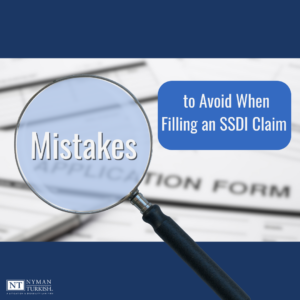Mistakes to Avoid When Filing an SSDI Claim
Filing a claim for Social Security Disability Insurance (SSDI) benefits is a complex and time-consuming process. At Nyman Turkish, we understand how stressful this can be on top of dealing with your existing health conditions.
Applying for Social Security Disability Insurance (SSDI) benefits is a complex and time-consuming process. At Nyman Turkish, we understand how stressful this can be on top of dealing with your existing health conditions.
Here are some common mistakes to avoid when filing an SSDI claim:
Waiting too long
To qualify for SSDI benefits, you must have a mental or physical disability that either prevents you from working for at least 12 months, is expected to prevent you from working for at least 12 months, or is a condition expected to result in death. As soon as you become aware of your inability to work for this duration, you should begin the application process. The SSDI application process can take months, if not years, to go through, and it’s important to file within a specific timeframe after you stop working to maintain eligibility. During this time, the Social Security Administration may take an extended period to review your case, leaving many individuals in need of immediate benefits. This delay can be challenging, especially for those who rely on this financial support to manage daily living expenses and medical costs.
Incomplete or Incorrect Information
When filling out your application, carefully re-read and cross-check the information you’ve entered to ensure there are no errors or incomplete data. Technical errors are common and can delay your application or even lead to denial. Even something as small as a typo in your zip code can cause major issues with your SSDI claim. A simple mistake like this might cause the Social Security Administration to process your claim at the wrong office, significantly delaying the review and approval process.
Missing Information
Including a complete medical history as part of your records is vital to your claim. For example, if you are suffering from a physical impairment that has affected your mobility and ability to work, and as a result, you are experiencing depression, you should include that information in your application. The SSA will thoroughly review your medical records when deciding on your claim. Your case depends on your medical records, and providing detailed information about your inability to work increases your chances of receiving approval.
Employment history
To be eligible for SSDI benefits, you must have earned 20 work credits in the last 10 years leading up to your disability from past jobs and paid into Social Security through FICA taxes. FICA, which stands for the Federal Insurance Contributions Act, is a payroll tax paid by both employers and employees. It funds programs like SSDI and Supplemental Security Income (SSI).
Your work history plays a crucial role in helping case examiners determine whether you can return to work, adapt to new types of work, and how much you will receive in benefits.
Not going to the doctor
The most important type of evidence that proves your claim for benefits is medical records. Consistently visiting the doctor will provide the necessary documentation for your case. While receiving care can be challenging when you are unable to work, there are likely options available to you if you have a disability. For example, if you need insurance coverage, programs like Medicare may be available to help you continue treatment. When you visit the doctor, be vocal about your symptoms and how they affect your daily life. You are your best advocate when you are at the doctor—no one can speak to your struggle better than you. If you don’t communicate how your conditions impact your ability to work, that information won’t appear in your medical records. You control the direction of the evidence in your case each time you treat with your doctors.
Not following a doctor’s treatment plan
If you have been seeing a doctor, it is important to follow any treatment plans they provide, such as taking medications, attending physical therapy, or using other methods to manage your symptoms. Failure to follow a doctor’s instructions can result in a denial of benefits. Your case will ultimately rely on your medical records.
Filing a new application instead of an appeal
The date when you initially apply for benefits is referred to as the protective filing date. This date is used to calculate how much you are owed in benefits. However, if you file a new application instead of an appeal, your protective filing date will change, and the entire process will start over. You risk not receiving the full amount of benefits or any back pay owed to you, and your claim could be technically denied if your current issues have already been adjudicated. Unless you have missed the deadline to appeal your claim, it is best to continue with your initial claim rather than start a new application. 
Missing crucial deadlines
The SSA will provide crucial deadlines and timelines for when certain actions need to be taken. For example, if your claim is denied, you have 60 days from the date you receive your notice of denial to request an appeal. If you miss that deadline, you will be ineligible for the appeal and will have to restart the process from scratch.
Applying without an attorney
Being unable to work and lacking the resources to care for yourself is stressful enough; worrying about your claim can add even more to that burden. It is highly recommended that you seek legal advice when filing for SSDI benefits. At Nyman Turkish, our expert staff and experienced attorneys are ready to assist you with care and compassion, while fiercely advocating on your behalf. Our no-fee guarantee and free case evaluation means that you won’t pay anything unless we win your case.
Going over SGA/ working too much
It is best to refrain from working while your SSDI claim is being processed. If you exceed the Substantial Gainful Activity (SGA) amount, the SSA will determine that you are not eligible for benefits. For 2024, the monthly SGA amount for statutorily blind individuals is $2,590. If you are not blind, the monthly SGA amount for 2024 is $1,550. If you are considering returning to work, it is extremely important to consult a lawyer to discuss the rules and regulations.
Fierce Advocacy
There are many factors that can complicate the SSDI claim process. Our Firm has over 35 years of experience handling Social Security Disability cases and is a national leader in the field. Our expert case managers, legal assistants, and attorneys are here to help you through every stage of this process. While you focus on your health, we will fight for the benefits you deserve. For assistance on your SSDI claim, call us at 877-529-4773 or visit our website for a FREE case evaluation.


